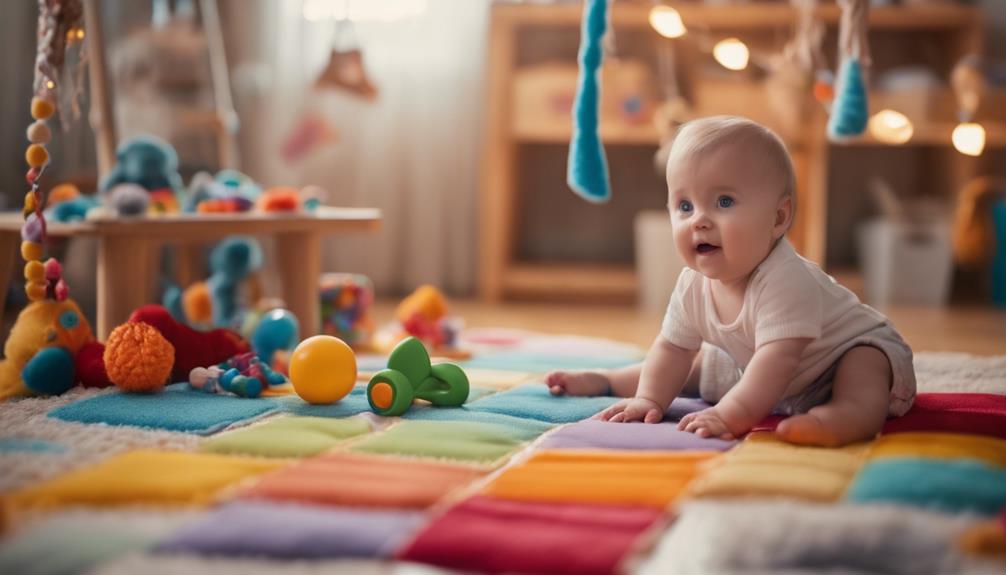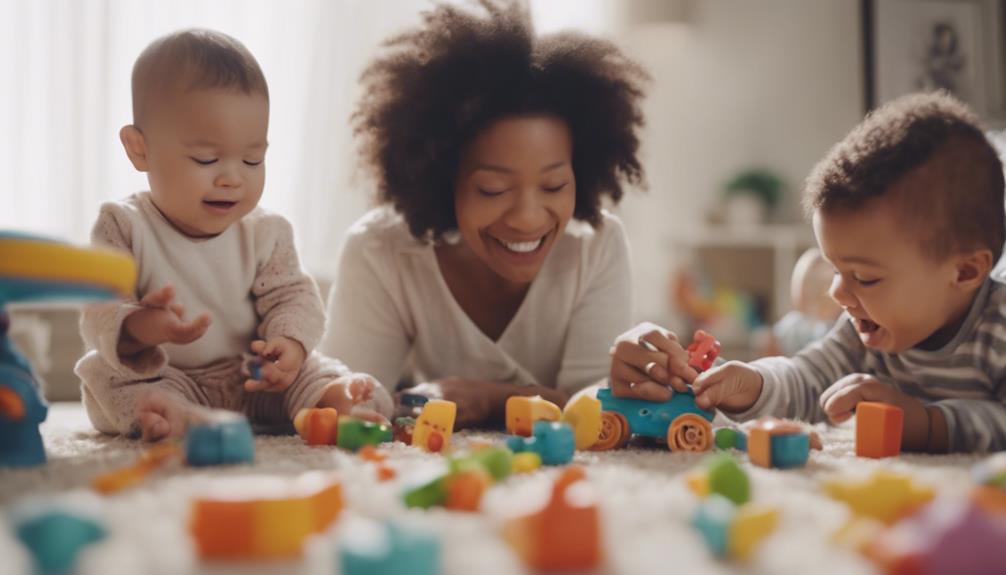To promote healthy brain development in babies, it is essential to focus on reading, talking, engaging in sensory play, establishing routines, prioritizing positive social interactions, and creating interactive environments. Experts strongly recommend these strategies. Reading and talking expose babies to new words, which can improve their language skills. Sensory play helps develop cognitive skills by engaging with different textures and sounds. Having consistent routines can provide a sense of security and emotional stability for babies. Positive social interactions help babies recognize social cues. Engaging in serve and return interactions can support language development. Providing a stimulating environment with interactive play can increase curiosity. By incorporating these methods, you can create an optimal environment for your baby’s brain development.
Key Takeaways
- Read and talk to your baby daily to enhance language skills and cognitive development.
- Provide sensory exploration opportunities with various textures and materials for brain connections.
- Establish a consistent routine to promote security, reduce stress, and aid cognitive development.
- Foster positive social interactions for emotional connections and healthy brain development.
- Engage in serve and return interactions through conversations to support language skills and neural connections.
Reading and Talking
Reading and talking to your baby regularly is crucial for stimulating their brain development. By engaging in these activities, you're helping your baby in language acquisition and cognitive development. According to experts, babies exposed to a variety of words early on tend to have stronger language skills later in life. When you read to your baby, you're introducing new words, sounds, and concepts that aid in their overall brain development.
Similarly, talking to your baby not only promotes language acquisition but also encourages social interaction and emotional bonding.
Research has shown that the more words a baby hears, the better their language skills become. Dr. Smith, a renowned child psychologist, states, 'Reading and talking to babies from a young age lays a solid foundation for their language development and instills a love for learning.' As a result, make it a habit to read books and have conversations with your baby to support their cognitive growth and nurture a strong parent-child bond.
Sensory Exploration

When it comes to sensory exploration with your baby, engaging in activities that stimulate their senses is essential.
Providing various textures, shapes, and materials for exploration can greatly enhance their sensory development.
These experiences help your baby make important brain connections and develop vital cognitive skills.
Engaging Sensory Activities
Exploring various sensory activities with your baby can play an essential role in stimulating their brain development. Engaging in sensory exploration, such as feeling different textures or playing with water, can enhance cognitive skills by introducing babies to various scents, sounds, and tastes. Providing sensory toys like rattles, musical instruments, and soft fabrics not only engages their senses but also promotes brain growth. Sensory play is important for developing fine motor skills as babies grasp, touch, and manipulate objects of different shapes and sizes. Through multi-sensory experiences, babies foster curiosity, exploration, and cognitive development.
To help you understand the significance of engaging sensory activities, consider the following table:
| Sensory Activities | Benefits | Examples |
|---|---|---|
| Feeling textures | Stimulates brain development | Soft fabrics, rough surfaces |
| Playing with water | Enhances cognitive skills | Splashing, pouring |
| Exploring scents | Engages sensory perception | Aromatherapy, scented toys |
Promoting Cognitive Growth
To further enhance your baby's cognitive growth, consider incorporating sensory exploration activities that stimulate their developing brain. Engaging in sensory play with various textures and materials can have a profound impact on your child's cognitive development.
According to child development experts, offering cause-and-effect toys can help infants build problem-solving skills and enhance their cognitive abilities. Additionally, gentle massages provide sensory experiences that aid in your baby's cognitive development by promoting relaxation and increasing body awareness.
Introducing different scents for your baby to explore can also support their sensory and cognitive development, as they learn to distinguish between various smells and make connections with their environment.
Enhancing Brain Connections
Engage your baby in sensory exploration activities to enhance brain connections and stimulate multiple senses simultaneously. By providing a variety of textures, sounds, and scents, you can promote brain development in different areas.
Sensory play is essential for cognitive development as it allows babies to learn through touch, sight, and sound, aiding in the formation of neural pathways. Encouraging your little one to explore various sensory experiences supports the intricate network of brain connections necessary for learning and understanding the world around them.
Introduce different textures through playtime activities.
Incorporate various sounds to stimulate auditory senses.
Use scented items or foods to engage the sense of smell.
Offer tactile experiences like finger painting or exploring different materials.
These sensory experiences not only entertain your child but also play a crucial role in shaping their brain development and fostering cognitive growth.
Consistent Routine

Establishing a consistent routine for your baby is essential for promoting their sense of security and aiding in brain development. By structuring your child's time with a predictable routine, you're providing a foundation that supports their cognitive development and emotional well-being.
Regular schedules for feeding, napping, and playtime help babies learn patterns and establish healthy habits. According to experts, predictable routines can reduce stress and anxiety in babies, creating an ideal environment for brain growth. Consistency in daily activities like bedtime and mealtimes further contributes to cognitive development and emotional stability.
Dr. Smith, a child psychologist, emphasizes the importance of routines, stating, 'A consistent routine helps babies feel secure and understand the world around them.' Additionally, establishing a routine can enhance parent-child bonding and communication, which ultimately fosters a strong foundation for your baby's brain development.
Stick to a consistent schedule to provide your baby with the stability they need for healthy growth.
Positive Social Interactions

Fostering positive social interactions with your baby is essential for stimulating their brain development. Engaging in meaningful conversations, making eye contact, and responding to your baby's cues all play a significant role in enhancing their learning abilities.
Here are some key points to keep in mind when promoting positive social interactions with your little one:
- Emotional Connection: Creating a strong emotional bond with your baby through positive interactions is critical for their overall brain development.
- Learning Through Engagement: Babies learn best through interaction, so make sure to engage in activities that promote back-and-forth communication.
- Understanding Social Cues: Positive social interactions help babies recognize and understand social cues, setting the foundation for healthy social development.
- Building Secure Attachments: Quality time spent with caregivers strengthens the bond between parent and child, leading to secure attachments that are essential for a baby's emotional well-being.
These interactions not only shape your baby's social skills but also contribute significantly to their cognitive and emotional growth.
Serve and Return Interactions

When interacting with your baby, remember to engage in conversations and encourage responsiveness.
By responding enthusiastically to their cues, such as babbling or pointing, you're actively shaping their brain development.
These serve and return interactions play an important role in fostering language skills, social connections, and emotional bonds with your little one.
Engage in Conversations
Engaging in conversations through serve and return interactions is an essential way to promote your baby's brain development. By actively participating in these interactions, you're fostering strong neural connections in your baby's brain, which are vital for their overall growth and development.
Here are some key points to keep in mind when engaging in conversations with your baby:
- Respond promptly to your baby's cues during conversations to create a supportive environment for their language development.
- Conversations with babies provide valuable opportunities for cognitive growth as they learn to process and respond to different stimuli.
- Serve and return interactions help build the foundation for strong neural connections in your baby's brain, supporting their learning and understanding of the world around them.
- Talking to babies in a responsive and engaging manner not only aids in cognitive development but also promotes their social and emotional well-being.
Encourage Responsiveness
How can you promote healthy brain development in infants through interactive exchanges known as serve and return interactions?
Serve and return interactions involve responding promptly and engagingly to a baby's cues, creating a back-and-forth exchange that helps build essential neural connections in the child's brain.
According to the Harvard University Center on the Developing Child, these interactions are 'like a game of tennis: the 'back and forth' of these interactions is the cornerstone of healthy brain development.'
Engaging in these developmentally appropriate exchanges from the first days of a child's life can have a profound impact on their cognitive abilities.
Stimulating Environment

Creating a vibrant environment for your baby involves introducing age-appropriate toys and activities that engage their senses. To stimulate your baby's brain development effectively, consider the following:
- Provide a variety of sensory experiences: Incorporate different textures, sounds, and colors into your baby's environment to promote cognitive skills and emotional well-being.
- Offer interactive play opportunities: Engage your baby in activities that encourage exploration and curiosity while ensuring a beneficial setting for their development.
- Maintain a calm and nurturing atmosphere: Creating a soothing environment supports emotional well-being, which is essential for the best brain growth.
- Foster a strong parent-child bond: Through simple games, music, and interactive reading sessions, you can enhance cognitive skills and strengthen the bond between you and your baby.
Frequently Asked Questions
How Can I Stimulate My Baby's Brain Development?
To stimulate your baby's brain development, engage in one-on-one interactions through talking, playing, and reading. Avoid excessive screen time and opt for interactive activities. Choose age-appropriate toys and activities that encourage curiosity, interaction, and skill development.
What Are 3 Ways That You Can Increase the Development of an Infant's Brain?
Interact one-on-one with your infant by talking, playing, and reading. Avoid passive activities like TV. Create a supportive, loving environment to reduce stress. Foster emotional connections through nurturing interactions. Encourage exploration, curiosity, and engagement.
How Can I Stimulate My Baby's Cognitive Development?
To stimulate your baby's cognitive development, engage in interactive activities like peekaboo and stacking blocks. Read aloud, sing songs, and describe daily activities. Provide age-appropriate toys for exploration and problem-solving. Encourage cause-and-effect play with toys like shape sorters.
How to Increase IQ Level of Baby?
To increase your baby's IQ level, engage in interactive activities like talking, singing, and reading. Provide a nurturing environment for emotional well-being. Encourage sensory exploration with toys. Offer varied stimulation with colorful toys, music, and textures. Maintain a balanced diet for cognitive development.
Conclusion
To sum up, fostering a baby's brain development is essential for their overall growth and learning potential. By engaging in activities such as reading, sensory exploration, and positive social interactions, you can help create a strong foundation for their future cognitive abilities.
Remember, as the saying goes, 'A child's mind is like a sponge, ready to soak up new experiences and knowledge.' So, be sure to provide a stimulating environment that encourages their curiosity and exploration.










